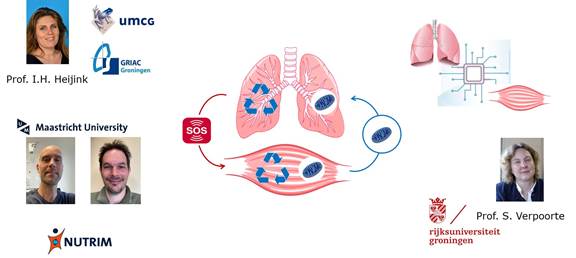
Our ZonMw proposal is granted for funding! Starting from coming autumn we will be in a consortium investigating the mitochondrial dysfunction in COPD.
CHRONIC OBSTRUCTIVE PULMONARY DISEASE (COPD) is a prevalent, debilitating lung disease characterized by abnormal repair and irreversible damage in the lungs that currently cannot be treated and is often accompanied by skeletal muscle weakness. Convincing evidence implicates a role for defective mitochondria in lung and muscle pathology in COPD, resulting in impaired tissue repair responses. Stress signals released from damaged COPD lungs are known to cause loss of mitochondrial capacity in skeletal muscle. In turn, the muscle is known to act as a reservoir of metabolic support for other organs, at its own expense. Recent evidence suggests that skeletal muscle can secrete intact mitochondria in vesicles. Lung injury may hence be perceived as trigger for mitochondrial release by the muscle.
We hypothesize that mitochondrial dysfunction in COPD leads to injury, triggering mitochondrial transfer from skeletal muscle, which in presence of aberrant muscle regenerative responses culminates in loss of muscle oxidative capacity as well as persistent lung damage.
We will address our hypothesis in five objectives:
- Establish whether impaired lung mitochondrial function and rejuvenation in COPD is associated with impaired lung epithelial regeneration;
- Assess whether impaired muscle mitochondrial function and rejuvenation in COPD results in impaired muscle regeneration;
- Address whether lung damage triggers mitochondrial transfer from muscle to lung tissue;
- Investigate whether in COPD loss of muscle oxidative capacity results in insufficient support of mitochondrial rejuvenation and regenerative responses in the lung;
- Explore whether restoring muscle mitochondrial health reverses mitochondrial dysfunction and lung damage in COPD.
Within our consortium, we have unique expertise to evaluate the role of mitochondrial dysfunction in lung and muscle regenerative responses. Investigating the novel concept proposed here on the crosstalk between lung and muscle to control mitochondrial homeostasis, we expect to identify of novel strategies to treat COPD.

